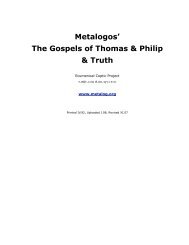Andrew Louth - Syriac Christian Church
Andrew Louth - Syriac Christian Church
Andrew Louth - Syriac Christian Church
Create successful ePaper yourself
Turn your PDF publications into a flip-book with our unique Google optimized e-Paper software.
NOTES<br />
1<br />
LIFE AND TIMES<br />
1 For Maximus’ life, see principally Sherwood (1952), 1–22.<br />
2 In the account of his trial in 655, Maximus states that he was then 75<br />
years old: PG 90:128C.<br />
3 Printed in the Migne edition of Maximus: PG 90.68–109.<br />
4 Maximus himself confesses, in his prologue to the Mystagogia that he<br />
was privately educated and was not initiated into logoi technikoi (660B),<br />
which Berthold plausibly translates ‘art of discourse’ (Berthold [1985],<br />
183). But this is a topos, so perhaps is not to be taken seriously.<br />
Maximus’ style has, however, little of the graces of rhetoric, while being<br />
formidably learned at times.<br />
5 Lackner (1967), 294f.<br />
6 Lackner (1971). There is, as Lackner indicates, direct evidence from<br />
Maximus’ own works that he had once been in the service of the<br />
‘Emperor here below’ (Ep. 12:91.505B).<br />
7 And finds support from Maximus’ own words in Ep. 12 (505B).<br />
8 In the account of his trial in 655, Maximus states that Anastasius had<br />
then been his disciple for thirty-seven years (PG 90:128C).<br />
9 Brock (1973).<br />
10 There is an echo of this tradition in the <strong>Syriac</strong> chronicle of Michael the<br />
Syrian and another anonymous <strong>Syriac</strong> chronicle, which note that<br />
Maximus was of Palestinian origin, from ‘Iasphin’: quoted in<br />
Guillaumont (1962), 179, and noted by Lackner (1967), 291.<br />
11 I do not, however, think it at all plausible simply to take the evidence of<br />
the <strong>Syriac</strong> life for Maximus’ childhood, and then add on the Greek<br />
evidence for the period from his time at the court of Heraclius, as<br />
Kazhdan seems to do (Kazhdan [1991], 2, 1323f., s.v. ‘Maximos the<br />
Confessor’): it is simply incredible that a Palestinian monk could have<br />
become protoasecretis. Dalmais (1982) presents a more plausible case,<br />
arguing that Maximus’ connections with the court were forged when he<br />
was a monk in Chrysopolis, an émigré from Palestine, then overrun by




